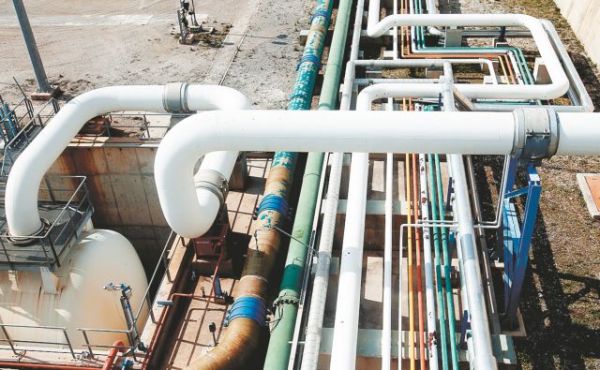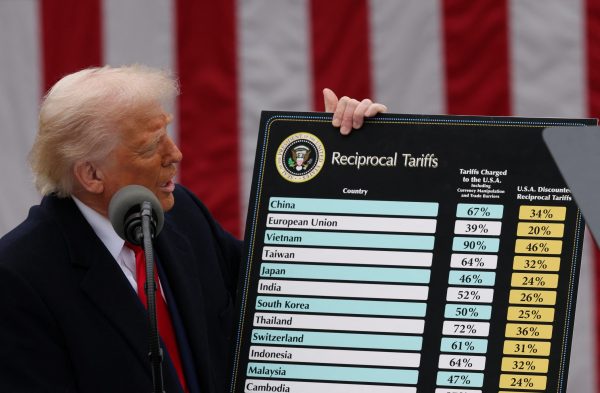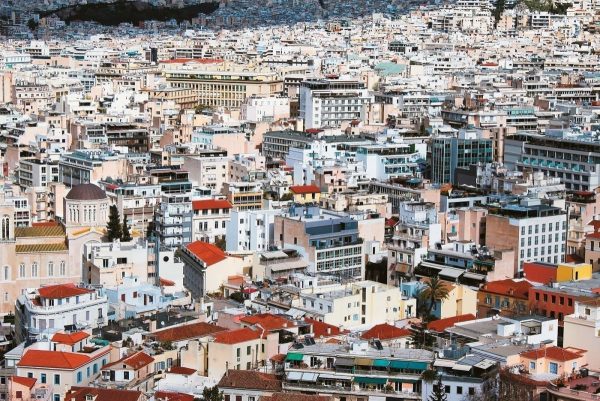
Greece is outside the European map of Underground Gas Storage Facilities, failing for years to utilize the depleted natural gas field of South Kavala in order to turn it into a fuel storage facility.
At a critical juncture in which the EU has decided to divest its members from Russia’s Gazprom and as a first step to fill the existing UGSFs in view of the next difficult winter, Athens seems to be hindering the ongoing competition of the HRADF for the development of UGSF South Kavala. An infrastructure that would additionally shield the country’s energy system as it would have, in addition to DESFA LNG Terminal, another useful reserve to meet its natural gas needs.
170 UGSFs in Europe
According to data collected by OT, there are 170 LNG facilities in the EU. The capacity of the underground warehouses amounts to more than 121.1 billion cubic meters of natural gas or 4.2 trillion cubic feet with 42% of them located in Germany (60 UGSF – 31 billion cubic meters), 16 in France, 13 with a capacity of 15 billion. sq.m. in Italy and an additional seven under construction in that country. The Netherlands is also among states with 5 LNG high capacity gas storage facilities. In the Balkans Romania has a large number of storage facilities with a total capacity of 2.5 billion. cubic meters.
The EU Following the Russian invasion of Ukraine and the pre-war energy crisis when Gazprom did not fill eight of its facilities in Europe, it ordered its member states to fill all their facilities to ensure gas reserves. next winter.
The case of N. Kavala
Greece is absent from this initiative as the tender for the development of infrastructure in N. Kavala has been stuck for more than six months in the delay concerning the issuance of the pricing regulation by the Regulatory Authority for Energy. RAE finally gave a public consultation but although it expired on March 14, it gave another extension until the end of the month. Market sources tell OT that with these data it is doubtful whether at the end of May the potential investors will be able to give binding offers, so that from the end of 2022 to the beginning of 2023 the investments for the conversion of the old submarine deposit of South Kavala to a UGSF will have started.
What this means
“The creation of underground storage in Greece”, according to competent officials, “in order to increase the level of security of supply of the country with natural gas and not to lead the National Natural Gas System (NSF) to extreme situations, is one way”. As the same circles explain to OT: “As our country does not have an underground gas storage, it is crucial for the HRADF tender for UGSF South Kavala to proceed and succeed. In a prolonged crisis, in countries without underground gas storage facilities, the shortage of supply from one or more sources is usually compensated either by emergency gas imports or, if these are not possible, sufficient or timely, by cuts in deliveries to consumers. ”
An underground storage infrastructure is a significant investment for any Natural Gas Transmission System as it contributes significantly to the optimization of its operation (load balancing, gas hub) and strengthens the energy security of the natural gas market (security of supply) at national and European level, to benefit of the final consumer.
Energy crises and sufficiency
The underground storage facility is a tool that offers a variety of support mechanisms to limit and prevent security of supply crises. Indicatively, the underground storage facilities can function as an additional entry point to the Transmission System, thus increasing the level of security of supply of the country with natural gas. In UGSFs, significant quantities of natural gas are stored on a long-term basis, either for commercial purposes or for use in times of need – it is estimated that when the underground storage in South Kavala is constructed, natural gas can be stored for 20 days, a period considered by experts large and crucial to “absorb” shocks in sufficiency, but also in gas prices.
It is worth emphasizing that Greece and Europe are experiencing the third serious energy crisis. The previous two in 2012 and the period 2016-2017 were caused due to the lack of necessary quantities of natural gas. Our country was found on a precarious “tightrope” to meet the needs and it achieved this thanks to the LNG Terminal in Revythousa. Now, that alone is not enough, according to the remarks of competent officials.
Latest News

Trump Tariffs Jeopardize Growth: Piraeus Chamber of Commerce
The tariffs, aimed at reducing the U.S. trade deficit, are expected to have both direct and indirect effects on the European economy

EU Condemns Trump Tariffs, Prepares to Retaliate
As tensions escalate, the EU is expected to continue negotiations with Washington while preparing for potential economic retaliation.

The Likely Impact of Trump Tariffs on Europe and Greece
Trump tariffs are expected to negatively affect economic growth in the Eurozone while Greece's exports could take a hit.

Motor Oil Results for 2024: Adjusted EBITDA of 995 mln€; Proposed Dividend of 1.4€ Per Share
Adjusted EBITDA for 2024 was down 33% yoy. The adjusted profit after tax for 2024 stood at 504 million euros, a 43% decrease from the previous year

Cost of Living: Why Greece’s 3% Inflation Is Raising Alarm
Greece appears to be in a more difficult position when it comes to price hikes, just as we enter the era of Trump’s tariffs.

Fitch Ratings Upgrades the Four Greek Systemic Banks
NBG’s upgrade reflects the bank’s ongoing improvements in its credit profile, Fitch notes in its report, including strong profitability, a reduction in non-performing exposures (NPEs), and lower credit losses

Trump to Announce Sweeping New Tariffs Wednesday, Global Retaliation Expected
With Trump's announcement just hours away, markets, businesses, and foreign governments are bracing for the fallout of one of the most aggressive shifts in U.S. trade policy in decades.

Inflation in Greece at 3.1% in March, Eurostat Reports
Average inflation in the eurozone settled at 2.2%, compared to 2.3% in February

Greece’s Unemployment Rate Drops to 8.6% in February
Despite the overall decline, unemployment remains higher among women and young people.

Jerry Kalogiratos Highlights Key Role of Energy Transition and Data Demand in LNG Outlook
Energy transition and the prospects of LNG were discussed at Capital Link’s 19th Annual International Maritime Forum, during a panel discussion with Jerry Kalogiratos (Capital Clean Energy Carriers Corp.)
























![ΕΛΣΤΑΤ: Αυξήθηκε η οικοδομική δραστηριότητα κατά 15,6% το Δεκέμβριο [πίνακες]](https://www.ot.gr/wp-content/uploads/2025/03/DSC9655-2-1024x569-1-90x90.jpg)
















 Αριθμός Πιστοποίησης
Αριθμός Πιστοποίησης